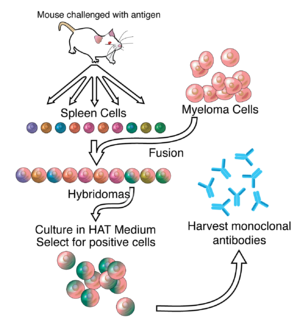
Back ضد وحيد النسيلة Arabic Monoklonska аntitijela BS Anticòs monoclonal Catalan Monoklonální protilátka Czech Monoklonale antistoffer Danish Monoklonaler Antikörper German Μονοκλωνικό αντίσωμα Greek Anticuerpo monoclonal Spanish Antigorputz monoklonal Basque آنتیبادی منوکلونال Persian

A monoclonal antibody (mAb, more rarely called moAb) is an antibody produced from a cell lineage made by cloning a unique white blood cell. All subsequent antibodies derived this way trace back to a unique parent cell.
Monoclonal antibodies can have monovalent affinity, binding only to the same epitope (the part of an antigen that is recognized by the antibody).[3] In contrast, polyclonal antibodies bind to multiple epitopes and are usually made by several different antibody-secreting plasma cell lineages. Bispecific monoclonal antibodies can also be engineered, by increasing the therapeutic targets of one monoclonal antibody to two epitopes.
It is possible to produce monoclonal antibodies that specifically bind to almost any suitable substance; they can then serve to detect or purify it. This capability has become an investigative tool in biochemistry, molecular biology, and medicine. Monoclonal antibodies are used in the diagnosis of illnesses such as cancer and infections[4] and are used therapeutically in the treatment of e.g. cancer and inflammatory diseases.
- ^ Gelboin HV. "Cytochrome P450 Mediated Drug and Carcinogen Metabolism using Monoclonal Antibodies". home.ccr.cancer.gov. Archived from the original on 15 October 2004. Retrieved 2 April 2018.
- ^ Gelboin HV, Krausz KW, Gonzalez FJ, Yang TJ (November 1999). "Inhibitory monoclonal antibodies to human cytochrome P450 enzymes: a new avenue for drug discovery". Trends in Pharmacological Sciences. 20 (11): 432–438. doi:10.1016/S0165-6147(99)01382-6. PMID 10542439.
- ^ Liu JK (11 September 2014). "The history of monoclonal antibody development – Progress, remaining challenges and future innovations". Annals of Medicine and Surgery. 3 (4): 113–116. doi:10.1016/j.amsu.2014.09.001. ISSN 2049-0801. PMC 4284445. PMID 25568796.
- ^ Waldmann TA (June 1991). "Monoclonal antibodies in diagnosis and therapy". Science. 252 (5013): 1657–1662. Bibcode:1991Sci...252.1657W. doi:10.1126/science.2047874. PMID 2047874. S2CID 19615695.